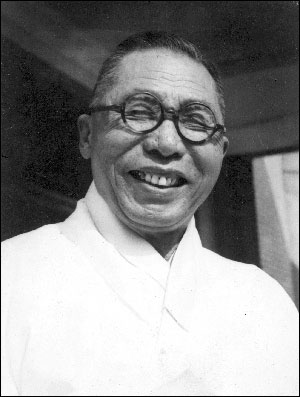Kim Ku
 Kim Ku (; August 29, 1876 – June 26, 1949), also known by his art name Paekpŏm,; also Baekbeom in Revised Romanisation}} was a Korean politician. He was a leader of the Korean independence movement against the Empire of Japan, head of the Korean Provisional Government for multiple terms, and a Korean reunification activist after 1945. Kim is revered in South Korea, where he is widely considered one of the greatest figures in Korean history.
Kim Ku (; August 29, 1876 – June 26, 1949), also known by his art name Paekpŏm,; also Baekbeom in Revised Romanisation}} was a Korean politician. He was a leader of the Korean independence movement against the Empire of Japan, head of the Korean Provisional Government for multiple terms, and a Korean reunification activist after 1945. Kim is revered in South Korea, where he is widely considered one of the greatest figures in Korean history.Kim was born into a poor farming family during the Joseon period. In Joseon's last century, it experienced several peasant rebellions and interventions from multiple global powers, including the Empire of Japan, the Russian Empire, Qing China, and the United States. Kim fought for Korean independence for most of his life, and was jailed, tortured, and permanently disfigured by Japanese authorities for his activities. He spent 26 years in exile in China, serving various roles in the Provisional Government and collaborating with the Republic of China. During this time, he founded and led the Korean Patriotic Organization and the Korean Liberation Army. He was the target of numerous assassination attempts and planned a number of his own, including an assassination attempt on Japanese Emperor Hirohito. After the 1945 surrender of Japan in World War II, Kim returned to the peninsula alongside the provisional government and tried to prevent the division of Korea.
However, in 1949, just four years after his return and just before the outbreak of the 1950 Korean War, Kim was assassinated by Korean Lieutenant Ahn Doo-hee.
While Kim is mostly celebrated in modern South Korea, he is not without his share of critics. In 1896, Kim murdered a Japanese man whom he believed may have been connected to the Japanese military or even involved in the recent assassination of Empress Myeongseong. The man is generally agreed to be Tsuchida Josuke, a civilian merchant on a business trip. Kim was also involved in coordinating attacks against Japanese military and colonial government personnel. His legacy is somewhat less enthusiastically celebrated in North Korea, due to his anti-Communist views. Provided by Wikipedia
Showing 1 - 20 results of 128 for search 'Bo Fan', query time: 4.10s
Refine Results
-
1
-
2
-
3
Barnyardgrass Root Recognition Behaviour for Rice Allelopathy by Tingshuang Zhang, Bo Fan, Peng Wang
Published 2018-03-01Get full text
Article -
4
Analysis on the evolution law of creep-fatigue failure energy of deep anchored jointed rock mass by Yang SONG, Hui YANG, Yongqi LI, Bo FAN
Published 2022-08-01Get full text
Article -
5
Cable Incipient Fault Identification with a Sparse Autoencoder and a Deep Belief Network by Ning Liu, Bo Fan, Xianyong Xiao, Xiaomei Yang
Published 2019-09-01Get full text
Article -
6
Effect of Quadrature Control Mode on ZRO Drift of MEMS Gyroscope and Online Compensation Method by Feng Bu, Shuwen Guo, Bo Fan, Yiwang Wang
Published 2022-03-01Get full text
Article -
7
-
8
Effects of Physicochemical Properties of Different Substrates on Vegetative Growth of Bougainvillea spectabilis by Bo FAN, Lili YUAN, Zhengjun SHI, Cuiyu LAN
Published 2022-05-01Get full text
Article -
9
-
10
-
11
A Motion-Aware Siamese Framework for Unmanned Aerial Vehicle Tracking by Lifan Sun, Jinjin Zhang, Zhe Yang, Bo Fan
Published 2023-02-01Get full text
Article -
12
Fangchinoline Induces Apoptosis, Autophagy and Energetic Impairment in Bladder Cancer by Bo Fan, Xiaoyu Zhang, Yongliang Ma, Aili Zhang
Published 2017-10-01Get full text
Article -
13
-
14
Performance and Correlations of Weighted Circuit Networks by Tingyuan Nie, Bo Fan, Zuyuan Zhu, Lijian Zhou
Published 2020-01-01Get full text
Article -
15
Progress of minimally invasive thyroid surgery by LI Jiamin, KANG Jie, WU Bo, FAN Youben
Published 2023-05-01Get full text
Article -
16
Hybrid Polyester Self-Immolative Polymer Nanoparticles for Controlled Drug Release by Michael T. Gambles, Bo Fan, Aneta Borecki, Elizabeth R. Gillies
Published 2018-05-01Get full text
Article -
17
Changing Dynamics of Foreign Direct Investment in China’s Automotive Industry by Lingling Wang, Bo Fan, C. Bulent Aybar, Aysun Ficici
Published 2013-09-01Get full text
Article -
18
Detection and location of microaneurysms in fundus images based on improved YOLOv4 with IFCM by Weiwei Gao, Bo Fan, Yu Fang, Mingtao Shan, Nan Song
Published 2023-09-01Get full text
Article -
19
-
20
A Review of Current-Limiting Control of Grid-Forming Inverters Under Symmetrical Disturbances by Bo Fan, Teng Liu, Fangzhou Zhao, Heng Wu, Xiongfei Wang
Published 2022-01-01Get full text
Article